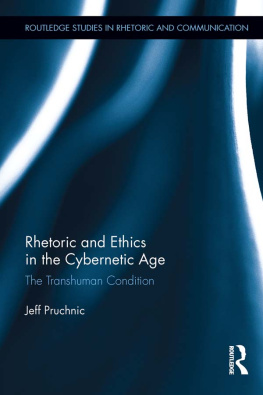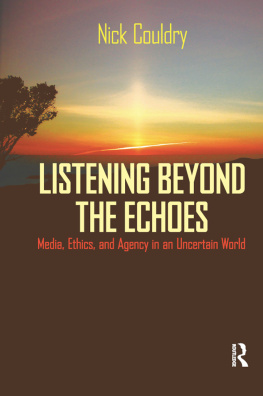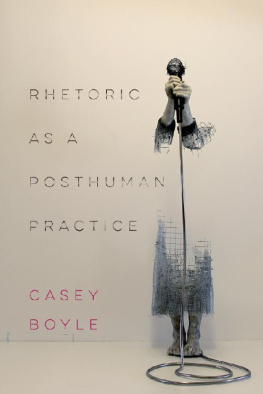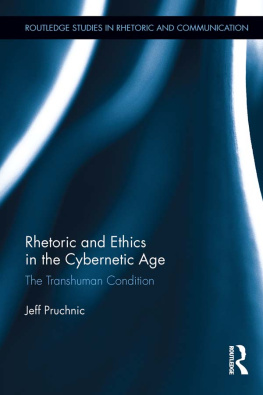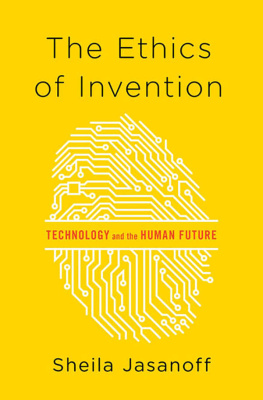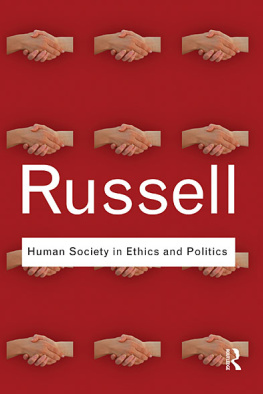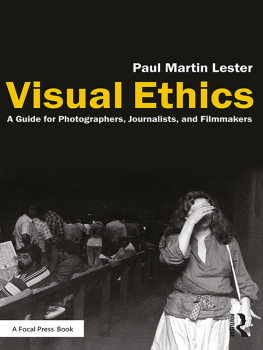Rhetoric and Ethics in the Cybernetic Age
It has become increasingly difficult to ignore the ways that the centrality of new media and technologiesfrom the global networking of information systems and social media to new possibilities for altering human geneticsseem to make obsolete our traditional ways of thinking about ethics and persuasive communication inherited from earlier humanist paradigms. This book argues that rather than devoting our critical energies towards critiquing humanist touchstones, we should instead examine the ways in which media and technologies have always worked as crucial cultural forces in shaping ethics and rhetoric. Pruchnic combines this historical itinerary with critical interrogations of diverse cultural and technological sitesthe logic of video games and artificial intelligence, the ethics of life extension in contemporary medicine, the transition to computer-automated trading in world stock markets, the state of critical theory in the contemporary humanitiesalong with innovative analyses of the works of such figures as the Greek Sophists, Kenneth Burke, Martin Heidegger, Michel Foucault, Friedrich Nietzsche, and Gilles Deleuze. This book argues that our best strategies for crafting persuasive communication and producing ethical relations between individuals will be those that creatively replicate and appropriate, rather than resist, the logics of dominant forms of media and technology.
Jeff Pruchnic is an Assistant Professor in English at Wayne State University, USA.
Routledge Studies in Rhetoric and Communication
Rhetorics, Literacies, and Narratives of Sustainability
Edited by Peter Goggin
Queer Temporalities in Gay Male Representation
Tragedy, Normativity, and Futurity
Dustin Bradley Goltz
The Rhetoric of Intellectual Property
Copyright Law and the Regulationof Digital Culture
Jessica Reyman
Media Representations of Gender and Torture Post-9/11
Marita Gronnvoll
Rhetoric, Remembrance, and Visual Form
Sighting Memory
Edited by Anne Teresa Demo and Bradford Vivian
Reading, Writing, and the Rhetorics of Whiteness
Wendy Ryden and Ian Marshall
Radical Pedagogies of Socrates and Freire
Ancient Rhetoric/Radical Praxis
S.G. Brown
Ecology, Writing Theory, and New Media
Writing Ecology
Edited by Sidney I. Dobrin
The Rhetoric of Food
Discourse, Materiality, and Power
Edited by Joshua J. Frye and Michael S. Bruner
The Multimediated Rhetoric of the Internet
Digital Fusion
Carolyn Handa
Communicating Marginalized Masculinities
Identity Politics in TV, Film, andNew Media
Edited by Ronald L. Jackson II and Jamie E. Moshin
Perspectives on Human-Animal Communication
Internatural Communication
Edited by Emily Plec
Rhetoric and Discourse in Supreme Court Oral Arguments
Sensemaking in Judicial Decisions
Ryan A. Malphurs
Rhetoric, History, and Women's Oratorical Education
American Women Learn to Speak
Edited by David Gold and Catherine L. Hobbs
Cultivating Cosmopolitanism for Intercultural Communication
Communicating as Global Citizens
Miriam Sobr-Denton andNilanjana Bardhan
Environmental Rhetoric and Ecologies of Place
Edited by Peter N. Goggin
Rhetoric and Ethics in the Cybernetic Age
The Transhuman Condition
Jeff Pruchnic
Rhetoric and Ethics
in the Cybernetic Age
The Transhuman Condition
Jeff Pruchnic

First published 2014
by Routledge
711 Third Avenue, New York, NY 10017
Simultaneously published in the UK
by Routledge
2 Park Square, Milton Park, Abingdon, Oxon OX14 4RN
Routledge is an imprint of the Taylor & Francis Group, an informa business
2014 Taylor & Francis
The right of Jeff Pruchnic to be identified as author of this work has been asserted by him in accordance with sections 77 and 78 of the Copyright, Designs and Patents Act 1988.
All rights reserved. No part of this book may be reprinted or reproduced or utilised in any form or by any electronic, mechanical, or other means, now known or hereafter invented, including photocopying and recording, or in any information storage or retrieval system, without permission in writing from the publishers.
Trademark Notice: Product or corporate names may be trademarks or registered trademarks, and are used only for identification and explanation without intent to infringe.
Library of Congress Cataloging-in-Publication Data
Pruchnic, Jeff.
Rhetoric and ethics in the cybernetic age : the transhuman condition / by Jeff Pruchnic.
p. cm. -- (Routledge studies in rhetoric and communication ; 17) Includes bibliographical references and index.
1. InternetSocial aspects. 2. InternetMoral and ethical aspects.
3. Information technologySocial aspects. 4. Information
technologyMoral and ethical aspects. I. Title.
HM851.P768 2013
302.231dc23
2013011250
ISBN: 978-0-415-84034-7 (hbk)
ISBN: 978-0-203-76841-9 (ebk)
Typeset in Sabon
by IBT Global.

For my wife, Millie Rovan Pruchnic, and my daughter, StellaGrace Pruchnic, who inspire me every day.
Contents
The Age of the World Program:
The Convergence of Technics and Media
Rhetoric in the Age of Intelligent Machines:
Burke on Affect and Persuasion after Cybernetics
Any Number Can Play:
Burroughs, Deleuze, and the Limits of Control
One of a multitude of pairs of customizable (Product)
RED Converse shoes, in this case, the author's own.
In The Genealogy of Morals, Nietzsche, that most prescient and pre-eminent thinker of the transhuman, identifies debt, particularly in the form of personal obligations, as a quintessentially human quality, and one that has long been the source of many of the species's more destructive tendencies and stood in the way of human self-overcoming. Insofar as this book takes a number of its most important cues from Nietzsche's thought, this may put me in an awkward positionbecause I owe a number of debts to a wide variety of individuals who both inspired and supported its writing. However, given that one of this book's central arguments is for the potential of productively redirecting many of the negative qualities associated with human nature, perhaps we can just consider this acknowledgments section an example of that strategy.
The research for this book began as a dissertation project in the English Department of the Pennsylvania State University, and I owe perhaps my largest debt to my dissertation director and mentor, Richard Doyle (To Doc, with Love), and the other members of my committee: Stephen H. Browne, Cheryl Glenn, Jeffrey T. Nealon, and Jack Selzer. An even more long-standing debt is owed to Joseph O. Dewey, teacher and friend for almost two decades and counting. I am similarly grateful to my friend and frequent collaborator Antonio Ceraso; this book would have been far poorer without the insight and advice he has provided over the years.
This book also owes much to the immense support I have received from Wayne State University and its Department of English. Ellen Barton, Gwen Gorzelsky, and Richard Marback have been remarkable friends and mentors over the past several years, as have been the extraordinary group of scholars and teachers that make up Wayne State's English Department as a whole. The writing of this book has also benefited from a significant amount of institutional support from Wayne State, including a semester sabbatical, a summer research grant, and financial support of archival research. Much of the work between these pages also found its first form as talks delivered as part of the Wayne State Humanities Center's colloquium series, overseen by the always remarkable Walter Edwards.

